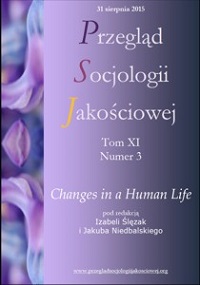Wpływ znaczących innych na przebieg procesu wychodzenia z prostytucji
DOI:
https://doi.org/10.18778/1733-8069.11.3.08Słowa kluczowe:
znaczący inny, sex work, prostytucja, symboliczny interakcjonizm, badania jakościowe, tożsamośćAbstrakt
Celem niniejszego artykułu jest zaprezentowanie barier wychodzenia z prostytucji, które wiążą się z wpływem znaczących innych na decyzje podejmowane przez osoby świadczące usługi seksualne. Analizie poddano dwie kategorie znaczących innych (organizacyjnych i intymnych), które poprzez interakcje odpowiednio w agencjach towarzyskich oraz na gruncie rodzinnym mogą wywierać destrukcyjny wpływ na zamierzenia związane ze zmianą swojego życia i odejściem z pracy seksualnej. Tym samym, opisane w artykule relacje ze znaczącymi innymi interweniują w proces transformacji tożsamości kobiet, utrudniając zbudowanie koncepcji siebie poza prostytucją. Artykuł opiera się na badaniach jakościowych zrealizowanych w agencjach towarzyskich jednego z dużych polskich miast.
Pobrania
Bibliografia
Adler Patricia A. and Peter Adler. 1994. “Observational Techniques.” Pp. 236-246 in Handbook of Qualitative Research, edited by N.K. Denzin, Y.S. Lincoln. Thousand Oaks: Sage.
Google Scholar
Berger, Peter L. and Thomas Luckman. 1966. The Social Construction of Reality. A Treatise in the Sociology of Knowledge. Garden City, New York: Doubleday.
Google Scholar
Bindel, Julie, et al. 2012. Breaking down the barriers: A study of how women exit prostitution. London: Eaves/London South Bank University (LSBU). Retrieved June 10, 2014 http://www.catwinternational.org/Home/Article/490-breaking-down-the-barriers-a-study-of-how-women-exit-prostitution
Google Scholar
Blumer, Herbert. 1986. Symbolic Interactionism: Perspective and Method. Berkeley, Los Angeles, London: University of California Press.
Google Scholar
Denzin, Norman K. 1972. “The Significant Others of a College Population.” Pp. 185-196 in Symbolic Interaction. A Reader in Social Psychology, edited by J.G. Manis, B.N. Meltzer. Boston, London, Sydney, Toronto: Allyn and Bacon.
Google Scholar
Glaser, Barney G. and Anselm L. Strauss. 1967. The Discovery of Grounded Theory. Strategies for Qualitative Research. New York: Aldine Publishing Company.
Google Scholar
Glaser Barney G. and Anselm L. Strauss. 1972. “Awareness Context and Social Interaction.” Pp. 447-461 in Symbolic Interaction. A Reader in Social Psychology., edited by J.G. Manis, B.N. Meltzer. Boston, London, Sydney, Toronto: Allyn and Bacon.
Google Scholar
Goffman, Erving. 1963. Stigma: Notes on the Management of Spoiled Identity. New York: Simon and Schuster.
Google Scholar
Golczyńska-Grondas, Agnieszka. 2014. “Wychowało nas państwo”. Rzecz o tożsamości dorosłych wychowanków placówek opiekuńczo-wychowawczych. Cracow: Zakład Wydawniczy NOMOS.
Google Scholar
Hughes, Everett C. 1958. Men and their work. Glencoe: Free Press.
Google Scholar
Konecki, Krzysztof. 2000. Studia z metodologii badań jakościowych. Teoria ugruntowana. Warsaw: Wydawnictwo Naukowe PWN.
Google Scholar
Kuhn, Manford H. 1972. “The Reference Group Reconsidered.” Pp. 171-184 in Symbolic Interaction. A Reader in Social Psychology., edited by J.G. Manis, B.N. Meltzer. Boston, London, Sydney, Toronto: Allyn and Bacon.
Google Scholar
Månsson, Sven-Axel and Ulla-Carin Hedin. 1999. “Breaking the Matthew effect - on women leaving prostitution.” International Journal of Social Welfare 8:67-77.
Google Scholar
DOI: https://doi.org/10.1111/1468-2397.00063
Mayhew Pat and Elaine Mossman. 2007. Exiting Prostitution: Models of Best Practice. Wellington, New Zealand: Ministry of Justice. Retrieved June 10, 2014 http://www.justice.govt.nz/policy/commercial-property-and-regulatory/prostitution/prostitution-law-review-committee/publications/exiting-prositution-models/documents/report.pdf
Google Scholar
Merton, Robert. 1968. Social Theory and Social Structure. New York: The Free Press.
Google Scholar
Rapley, Tim. 2007. Doing Conversation, Discourse and Document Analysis. London: Sage Publications.
Google Scholar
DOI: https://doi.org/10.4135/9781849208901
Sanders, Teela. 2007. “Becoming an Ex-Sex Worker: Making Transitions Out of a Deviant Career.” Feminist Criminology 2:74-95.
Google Scholar
DOI: https://doi.org/10.1177/1557085106294845
Shibutani, Tamotsu. 1962. “Reference Group and Social Control.” Pp. 128-147 in Human Behavior and Social Processes. An Interactionist Approach, edited by A.M. Rose. Boston: Houghton Mifflin Company.
Google Scholar
Schütze, Fritz. 1981. “Prozesstrukturen des Lebensablaufs.” Pp. 67-156 in Biographie in handlungswissenschaftlicher Perspektive, edited by J. Matthes, M. Pfeinfenberger, M. Stosberg. Nürnberg: Verlag der Nürnberger Forschungsvereinigung.
Google Scholar
Strauss, Anselm L. 1997. Mirrors and Masks. The Search for Identity. New Brunswick, London: Transaction Publishers.
Google Scholar
Strauss, Anselm and Juliet Corbin. 1990. Basics of Qualitative Research. London: Sage Publications.
Google Scholar
Szulik, Małgorzata. 2006. “Psychologiczna sytuacja ofiary handlu ludźmi.” Pp. 369-378 in Handel ludźmi – zapobieganie i ściganie, edited by Z. Lasocik. Warsaw: Wydawnictwo Uniwersytetu Warszawskiego.
Google Scholar
Ślęzak, Izabela. 2014. “Kolektywny wymiar budowania zaangażowania w pracę seksualną kobiet świadczących usługi seksualne w agencjach towarzyskich.” Przegląd Socjologii Jakościowej 10(4):56-79. Retrieved March 21, 2015 http://www.przegladsocjologiijakosciowej.org/Volume28/PSJ_10_4_Slezak.pdf
Google Scholar
Ziółkowski, Marek. 1981. Znaczenie, interakcja, rozumienie. Warsaw: PWN.
Google Scholar
Pobrania
Opublikowane
Jak cytować
Numer
Dział
Licencja

Utwór dostępny jest na licencji Creative Commons Uznanie autorstwa – Użycie niekomercyjne – Bez utworów zależnych 4.0 Międzynarodowe.














